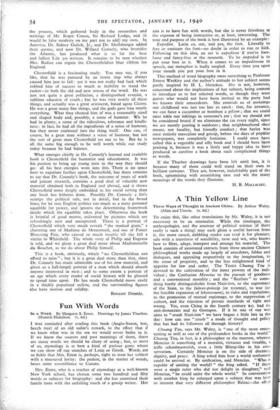Chesterfield
The True Chesterfield. By Willard Connely. (Cassell. iss.)
CHESTERFIELD was one of those nearly-great men who never quite " come off," possibly through some scepticism as to the value of what they seem to be pursuing. They have far more effect on their contemporaries than appears on the surface, and contribute very materially to the temper of their time. So Chesterfield is always worth studying. His reputa- tion, so long shrivelled by a brilliant but maliciously false epigram, and a perfect but unjustified letter, both by Dr. Johnson, began to revive at the end of the last century through the work of Lord Carnarvon. Several essayists encouraged
the process, which gathered body in the researches and writings of Mr. Roger Coxon, Sir Richard Lodge, and (it would be false modesty on my part not to add) my own. In America, Dr. Sidney Gulick, Jr., and Dr. Shellabarger added their quotas, and now Dr. Willard Connely, who bestrides the Atlantic, has produced what is so far the best and fullest Life yet written. It remains to be seen whether Mrs. Radice can regain the Chesterfieldian blue ribbon for England.
Chesterfield is a fascinating study. You may say, if you like, that he was pursued by an ironic imp who always caused him just to fail : yet it was not really bad luck which robbed him of success so much as inability to stand the racket—in both the old and new senses of the word. He was just not quite a great politician, a distinguished essayist, a sublime educator of youth ; but he was very nearly all these things, and actually was a great aristocrat, based upon Cicero. He was a great many fine things, and the gods gave him nearly everything. What they cheated him of was a reasonably sized and shaped body and, possibly, a sense of humour. Wit he had in plenty, a sense of the ridiculous, tolerance and kindli- ness : in fact, he had all the ingredients of a sense of humour, but they never coalesced into the thing itself. One can, of course, be a great man without a sense of humour, but not the sort of great man Chesterfield set out to be. But he is all the same big enough to be well worth while our study today because he had balance.
What emerges chiefly in Dr. Connely's learned and readable book is Chesterfield the humanist and educationist. It was his passion to bring up young men in the way they should go : all his best energies went into this. There is no space here to expatiate further upon Chesterfield, but there remains to say that Dr. Connely's book, the outcome of years of work and patient research, contains a good deal of valuable new material obtained both in England and abroad, and it shows Chesterfield more deeply embedded in his social setting than any book has hitherto done. Possibly Dr. Connely a little scamps the political side, not in detail, but in the broad lines, for he sees English politics too much as a mere personal squabble for power, and ignores the determining framework inside which the squabble takes place. Otherwise the book is brimful of good matter, enlivened by pictures which are refreshingly new and unexpected. There is a portrait of Chesterfield which very much reveals " the stunted giant," a charming one of Madame de Monconseil, and one of Fanny Blooming Fair, who caused so much trouble till she fell a victim to Whitefield. The whole story of Philip and Eugenia is told, and we glean a great deal more about Mademoiselle du Bouchet, as we do about Philip himself.
This is a book, obviously, which " no Chesterfieldian can afford to miss " ; but it is a great deal more than that, since Dr. Connely has made admirable use of his new material, and given us a full-length portrait of a man which should absorb anyone interested in men ; and to some extent a portrait of an age which every reader of social history will be pleased to spend time upon. He has made Chesterfield move easily in a thickly populated milieu, and the surrounding figures also have motion and solidity.
BONAMY DOBREE.



































 Previous page
Previous page